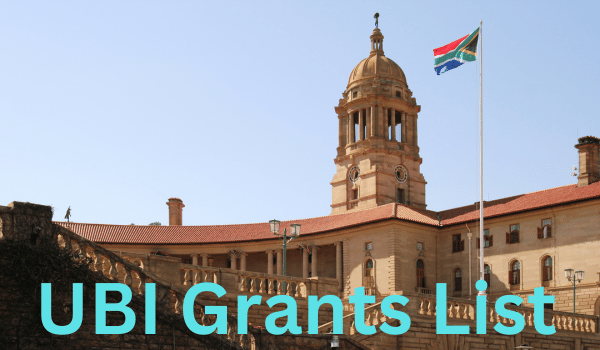UBI Grants List 2025: Universal Basic Income Grants Coming, Amount, Increase, and News: In a significant shift in social welfare policy, the South African Social Security Agency (SASSA) is transitioning from Social Relief of Distress (SRD) grants to a Universal Basic Income (UBI) framework. This change marks a pivotal moment in South Africa’s approach to alleviating poverty and ensuring economic stability for all citizens. This article delves into the details of the UBI grants for 2025, the expected amount, potential increases, and the latest news surrounding this groundbreaking initiative.
UBI Grants List 2025
Universal Basic Income (UBI) is a financial system where a government provides its citizens with a regular, unconditional sum of money, regardless of their income or employment status. The primary objective of UBI is to ensure that every citizen has access to a basic level of financial security, which can help mitigate poverty and reduce inequality. UBI is designed to provide a safety net that supports individuals in meeting their essential needs, such as food, housing, and healthcare.
The SRD grants were introduced as a temporary measure during the COVID-19 pandemic to provide financial relief to those severely affected by the economic downturn. While the SRD grants played a crucial role in supporting vulnerable populations, their temporary nature highlighted the need for a more sustainable solution. Enter UBI—a system that promises consistent and predictable financial support to all citizens.
SASSA’s decision to replace SRD grants with UBI is rooted in extensive research and policy discussions. The government recognizes that a permanent solution like UBI can address long-term economic disparities and foster a more inclusive economy. By implementing UBI, South Africa aims to ensure that every citizen can participate in the economy without the constant threat of financial instability.
UBI Grant Amount and Distribution
As of 2025, the UBI grants are set to be rolled out, with the government announcing specific details about the amount each citizen will receive. Initial reports suggest that the monthly UBI grant will be set at R1,500 per person. This amount is determined based on the cost of living and the goal of providing a substantial safety net that covers basic needs.

The distribution of UBI grants will follow a streamlined process, leveraging existing infrastructure used for other social grants. Beneficiaries will receive their UBI payments directly into their bank accounts or through mobile money platforms, ensuring efficient and timely disbursements. The system is designed to minimize administrative overhead and reduce the potential for fraud or mismanagement.
Potential Increases and Adjustments
One of the key features of the UBI system is its flexibility to adjust to economic conditions. The government has committed to reviewing the UBI grant amount annually to account for inflation and changes in the cost of living. This means that beneficiaries can expect periodic increases to ensure that the UBI grant remains adequate in meeting their needs.
Additionally, the government is exploring the possibility of introducing tiered UBI payments, where certain vulnerable groups, such as the elderly, disabled, and single-parent households, might receive higher amounts. These adjustments aim to provide targeted support to those who need it the most, ensuring that the UBI system is equitable and inclusive.
Economic and Social Implications
The introduction of UBI in South Africa is expected to have far-reaching economic and social implications. On the economic front, UBI can stimulate demand by increasing disposable income, which in turn can drive consumption and boost local businesses. By providing a stable source of income, UBI can also encourage entrepreneurship and innovation, as individuals have the financial security to take risks and pursue new ventures.
Socially, UBI has the potential to reduce poverty and inequality significantly. It can provide a lifeline to those living in extreme poverty, ensuring that everyone has access to basic necessities. UBI can also promote social cohesion by reducing the stress and anxiety associated with financial insecurity. With a guaranteed income, individuals can focus on personal development, education, and community engagement, leading to a more empowered and active citizenry.
Challenges and Criticisms
Despite its potential benefits, the implementation of UBI is not without challenges and criticisms. One of the primary concerns is the cost of financing such a comprehensive program. Critics argue that funding UBI could strain the national budget and necessitate higher taxes or cuts in other public services. To address these concerns, the government is exploring various funding mechanisms, including reallocating existing social welfare budgets and introducing progressive taxation policies.
Another criticism is the potential for UBI to disincentivize work. Some argue that providing a guaranteed income might reduce the motivation for individuals to seek employment. However, proponents of UBI counter this by highlighting that the financial security provided by UBI can empower individuals to pursue more meaningful and fulfilling work, rather than being forced into low-paying and precarious jobs out of necessity.
UBI Latest News and Future Outlook
As the 2025 rollout of UBI approaches, the South African government is actively engaging with stakeholders, including civil society organizations, economists, and the general public, to ensure a smooth transition. Pilot programs are being conducted in various regions to test the efficacy of the UBI system and gather valuable feedback.
Looking ahead, the success of UBI in South Africa could serve as a model for other countries grappling with similar economic challenges. By embracing UBI, South Africa is taking a bold step towards creating a more equitable and resilient society, where every citizen has the opportunity to thrive.
In conclusion, the introduction of UBI grants in 2025 marks a transformative moment in South Africa’s social welfare landscape. With the promise of financial security for all, UBI has the potential to reshape the economy, reduce poverty, and promote social well-being. As the country embarks on this new journey, the eyes of the world will be watching, hopeful that South Africa’s bold experiment with UBI will pave the way for a brighter and more inclusive future.